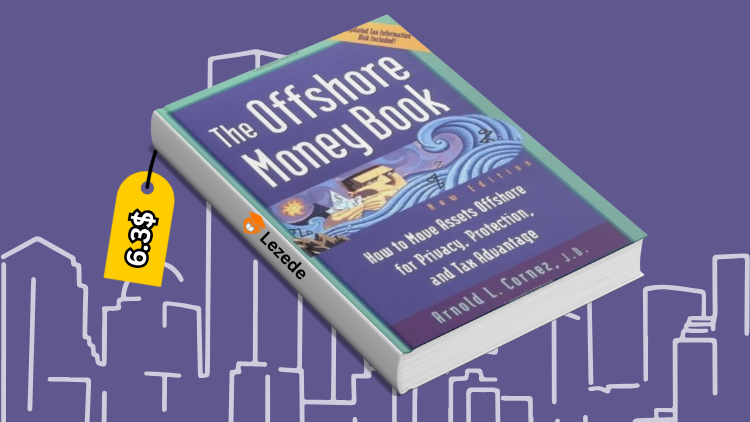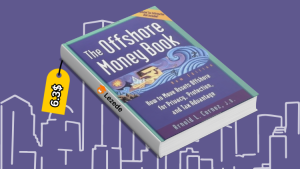Free Download The Offshore Money Book by Arnold Cornez
Check content proof, now:
Exploring the Depths of Offshore Finance: A Review of The Offshore Money Book by Arnold Cornéz
In an era of rapidly shifting financial regulations, The Offshore Money Book by Arnold Cornéz proves to be a guiding light for individuals interested in mastering the intricacies of offshore wealth management. This thorough and accessible guide examines key topics such as financial privacy, safeguarding assets, and utilizing global tax advantages. Whether you’re a veteran investor or simply offshore-curious, Cornéz offers a compelling foundation for building effective international strategies. But does the book translate its broad scope into clear, actionable knowledge? Let’s unpack its content in depth.
A Well-Rounded Framework for Global Investing
Cornéz presents a meticulously organized guide that addresses the fundamental elements of managing offshore assets. He clearly explains a variety of offshore structures and emphasizes the importance of understanding local laws and financial regulations. Much like a skilled navigator charting unknown seas, Cornéz equips his audience with the maps needed to explore the international financial domain with confidence.
Notable Offshore Strategies Covered:
-
International Business Companies (IBCs): Cornéz highlights how these versatile legal entities can support asset growth while reducing exposure to taxation and enhancing confidentiality.
-
Trusts: These instruments are presented as protective tools against litigation and economic volatility.
-
Foundations: The book explores foundations as strategic options for wealth preservation and generational planning.
By breaking down these vehicles in detail, Cornéz helps readers choose the right options based on their personal goals and financial circumstances.
Practical Tools and Reader-Friendly Content
One of the book’s most appealing features is its hands-on advice for finding reputable offshore service providers and avoiding fraudulent schemes. Cornéz moves beyond abstract theory to offer steps readers can follow to manage their offshore portfolios responsibly and effectively.
Supplementary Tools That Enhance the Book:
| Feature | Description |
|---|---|
| Appendix of Online Resources | A curated directory of reliable websites and platforms for international investing. |
| Glossary of Terms | Definitions for essential financial and legal vocabulary. |
| Management Tips | Step-by-step procedures for maintaining offshore structures properly. |
These resources help bridge the gap between theory and execution, making the book a practical manual rather than just a conceptual overview.
Reader Critiques and Areas for Improvement
Despite its thoroughness, the book has been critiqued for falling short in certain practical areas, particularly for those seeking implementation-ready advice.
Common Criticisms Include:
-
Lack of Specific Contacts: The book doesn’t provide referrals to trusted service providers, leaving readers to conduct their own research.
-
Information Overload for Beginners: Some newcomers may find the dense detail difficult to digest without prior background.
-
Limited Comparative Analysis: Readers looking for side-by-side comparisons of offshore jurisdictions and structures might find the book lacking in that regard.
Future editions could benefit from simplifying key sections, incorporating comparison tables, and adding vetted contact lists for legal and financial professionals.
A Cornerstone for Offshore Finance Enthusiasts
Even with its drawbacks, The Offshore Money Book remains a fundamental resource for those interested in international finance. It delivers both the strategic thinking and step-by-step processes necessary to engage with offshore opportunities.
Key Advantages Explained:
-
Financial Privacy & Asset Protection: Cornéz underscores the value of discretion and legal security in wealth management.
-
Tax Optimization: He outlines methods for legally minimizing tax obligations through careful jurisdiction selection.
-
Understanding Legal Systems: The book offers a solid foundation for interpreting offshore laws and regulatory frameworks.
Cornéz illustrates these principles with real-world examples that highlight successful implementation.
How It Compares to Other Offshore Finance Guides
When assessed alongside similar books, Cornéz’s work performs strongly in terms of clarity, comprehensiveness, and practical usability—even if it doesn’t tick every box.
| Feature | The Offshore Money Book | Alternative A | Alternative B |
|---|---|---|---|
| Depth of Coverage | Extensive | Moderate | High |
| Usability | Strong | Weak | Strong |
| Extras (Glossary, Resources) | Yes | No | Yes |
| Newcomer-Friendly | Very | Moderate | High |
| Service Provider Listings | No | Yes | No |
| Side-by-Side Comparisons | Minimal | Yes | Yes |
This table illustrates Cornéz’s strengths in practical teaching and resource inclusion, while highlighting potential areas where other books offer more targeted support.
Empowering Readers with Tools and Terminology
Cornéz enhances the learning experience by offering an online resource appendix and a robust glossary, helping readers grasp terminology and dive deeper into research independently.
Highlights from the Resource Tools:
-
Official Government Portals: Insights into legal requirements and jurisdiction-specific rules.
-
Industry News Sources: Real-time updates and financial developments.
-
Investment Platforms: Resources for implementing offshore strategies.
Key Glossary Entries:
-
IBC (International Business Company): A flexible offshore legal structure used for tax-efficient investing.
-
Asset Protection Trusts: Legal mechanisms designed to secure assets from creditors and lawsuits.
-
Tax Havens: Countries or jurisdictions offering favorable tax treatment to foreign investors.
These tools make the book far more user-friendly, especially for readers not familiar with offshore terminology.
Balancing Theory with Practical Application
One of Cornéz’s greatest strengths is blending foundational economic principles with real-world strategies. He doesn’t just explain the rationale behind offshore finance—he shows how to apply it.
Core Applications Discussed:
-
Setting Up IBCs: How to register and manage these entities, from paperwork to operations.
-
Trust-Based Estate Planning: Legal techniques for smooth inheritance and tax reduction.
-
Choosing the Right Jurisdiction: A guide to evaluating location-specific benefits such as stability, privacy, and tax efficiency.
The practical focus ensures readers walk away with usable knowledge, not just theoretical frameworks.
Clear Language and Straightforward Explanations
Cornéz’s writing style is another standout feature. He avoids overly complex language, breaking down advanced topics into accessible insights.
How He Improves Clarity:
-
Simplified Concepts: Challenging topics are made digestible through clear explanations.
-
Case Studies and Examples: Real-life stories ground the content in practice.
-
Visual Summaries: Charts and illustrations support better comprehension of structures and strategies.
This approach opens the subject matter to a broader audience, from beginners to mid-level investors.
A Logical and Effective Structure
The book’s layout is designed for progressive learning. Each chapter builds logically on the last, allowing readers to absorb complex material step-by-step.
Structural Benefits:
-
Progressive Chapter Flow: Material is sequenced to support a smooth learning curve.
-
Focused Sections: Each topic—IBCs, trusts, foundations—receives dedicated attention.
-
Reinforced Themes: Core ideas are revisited and expanded upon throughout the book.
The structured design aids retention and comprehension, making it easier for readers to revisit concepts as needed.
Protecting Wealth and Maintaining Privacy
Central to the book’s message is the importance of securing financial assets and preserving confidentiality. Cornéz emphasizes how offshore arrangements can act as a barrier against legal challenges and regulatory overreach.
Key Protection Strategies:
-
Jurisdictional Diversification: Placing assets in multiple regions to spread risk.
-
Use of Legal Shells: Entities like IBCs and trusts form protective layers around wealth.
-
Anonymous Structures: Approaches for maintaining owner confidentiality and shielding from external threats.
Cornéz details how to implement each of these techniques, providing a roadmap for those prioritizing asset security.
Tax Efficiency Through Offshore Planning
One of the core motivations for offshore strategies is optimizing tax burdens. Cornéz delves into the legal ways investors can take advantage of different tax codes to preserve wealth.
Tax Optimization Techniques:
-
Leveraging Tax Havens: Jurisdictions that legally reduce or eliminate tax exposure.
-
Avoiding Double Taxation: Making use of treaties to prevent being taxed by multiple governments.
-
Deferral Mechanisms: Structures that delay taxation, allowing investments to grow longer before being taxed.
These methods are explained with both strategic insight and compliance in mind, avoiding risky or unethical practices.
Efficient Offshore Asset Management
Sustaining an offshore portfolio requires diligent oversight and constant adjustment. Cornéz dedicates ample space to explaining how to manage these assets long-term.
Management Tactics:
-
Periodic Auditing: Routine checks to ensure legal and financial compliance.
-
Hiring Experts: Partnering with advisors who understand offshore regulations.
-
Ongoing Learning: Staying current with legal and market shifts to adjust strategies accordingly.
These management strategies help readers stay ahead in a fluid global financial landscape.
Final Thoughts: A Trusted Companion for Offshore Success
In summary, The Offshore Money Book by Arnold Cornéz offers a solid introduction to offshore finance. Its strengths lie in its comprehensive content, logical structure, and real-world guidance. While it may not answer every practical question or list specific providers, it excels in demystifying the offshore world. Ideal for those new to international finance or looking to enhance their understanding, Cornéz’s book lays the groundwork for successful offshore investing—with both the theory and the tools needed to move forward confidently.












